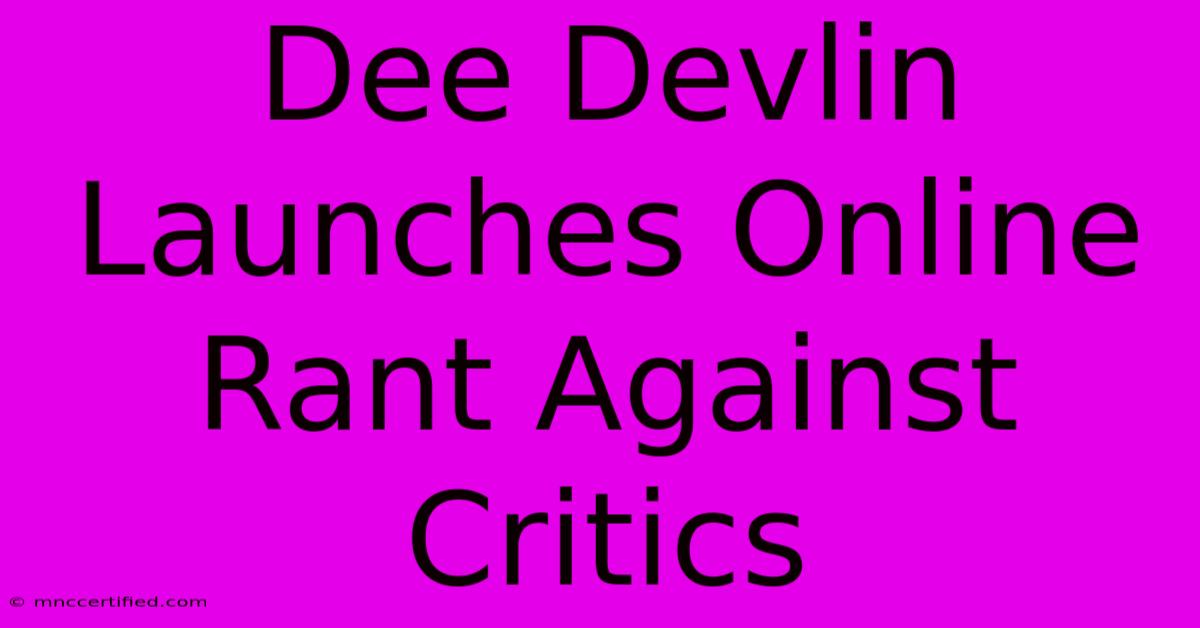Dee Devlin Launches Online Rant Against Critics

Table of Contents
Dee Devlin Launches Online Rant Against Critics: A Deep Dive into the Controversy
Introduction: Dee Devlin, long-time partner of boxer Conor McGregor, recently unleashed a furious online rant against her critics. This unexpected outburst has sparked intense debate and speculation across social media and news outlets. This article delves into the details of the rant, explores the potential reasons behind it, and analyzes the wider implications of celebrity online behavior.
The Online Rant: What Happened?
Dee Devlin, known for her relatively private life, took to [Specify platform, e.g., Instagram, Twitter] to address what she perceived as unfair and unwarranted criticism. While the exact content of her posts may vary depending on platform and whether they've since been deleted, reports suggest she fiercely defended herself and her family against accusations of [mention specific criticisms, e.g., extravagance, materialism, or negativity towards Conor's career]. She reportedly used strong language and directly addressed her detractors, leading to a significant online reaction.
Key Points of the Rant:
- Defense of Family: Devlin's primary focus appeared to be protecting her family from perceived negativity and unwarranted judgment. She emphasized the importance of family unity and privacy.
- Rejection of Public Scrutiny: The rant revealed Devlin's frustration with the constant public scrutiny she and her family endure. She asserted a right to privacy and a desire to protect her children from the harsh realities of online negativity.
- Counter-narrative: The rant served as a counter-narrative to what she saw as biased or inaccurate portrayals of herself in the media. She directly challenged the assumptions and opinions of her critics.
Why the Online Rant?
Several factors could have contributed to Dee Devlin's decision to publicly address her critics:
- Constant Online Harassment: The constant barrage of negative comments and online harassment could have reached a breaking point, leading to a reactive and emotional outburst.
- Protection of Children: The potential impact of negative online comments on her children likely played a significant role. Mothers are known to fiercely protect their children, and this could have been a major catalyst for the rant.
- Frustration with Media Representation: Misrepresentation or unfair portrayals in the media might have fueled Devlin's anger and desire to set the record straight.
The Implications of Celebrity Online Behavior
Dee Devlin's online rant highlights the complex relationship between celebrities, the media, and the public. It also underscores several crucial points:
- The Power of Social Media: Social media platforms provide celebrities with a direct line of communication to their fans and critics. However, this can also be a double-edged sword, leading to impulsive actions and unintended consequences.
- The Importance of Mental Health: The pressures of celebrity life, amplified by constant online scrutiny, can significantly impact mental well-being. This incident underscores the importance of self-care and seeking support when necessary.
- Ethical Considerations for Online Commentary: The rant serves as a stark reminder of the responsibility that comes with online commentary. Cyberbullying and online harassment are serious issues with potential long-term consequences.
Conclusion: Navigating the Digital Landscape
Dee Devlin's online rant serves as a case study in the complexities of navigating the digital landscape as a celebrity. It raises questions about privacy, mental health, and the ethical responsibilities of both public figures and online commentators. As social media continues to evolve, understanding these issues is crucial for fostering a more positive and respectful online environment. The incident underscores the need for empathy, responsible online behavior, and a greater awareness of the impact of words, both online and offline.
Keywords: Dee Devlin, Conor McGregor, online rant, celebrity controversy, social media, online harassment, cyberbullying, mental health, public scrutiny, media representation, family privacy, digital landscape.
SEO Strategies:
- On-Page SEO: Optimized title tag, meta description, header tags (H1-H6), keyword integration throughout the text, use of internal and external links (where appropriate and relevant).
- Off-Page SEO: Promote the article on social media, reach out to relevant news sites and blogs for potential backlinks, consider guest posting on other relevant websites. Engage in relevant online discussions and forums to increase visibility and build brand awareness. Monitor backlink profile and work on improving it for better SEO.

Thank you for visiting our website wich cover about Dee Devlin Launches Online Rant Against Critics. We hope the information provided has been useful to you. Feel free to contact us if you have any questions or need further assistance. See you next time and dont miss to bookmark.
Featured Posts
-
Bonding Through Shared Trauma
Nov 28, 2024
-
Winchester 270 Bonded Bullets
Nov 28, 2024
-
Thanksgiving 2024 Business Hours Guide
Nov 28, 2024
-
Carl Stuart Investment Advisor
Nov 28, 2024
-
Espn Jones Joins Minnesota Vikings
Nov 28, 2024